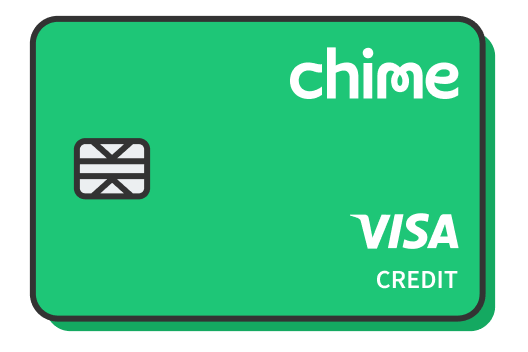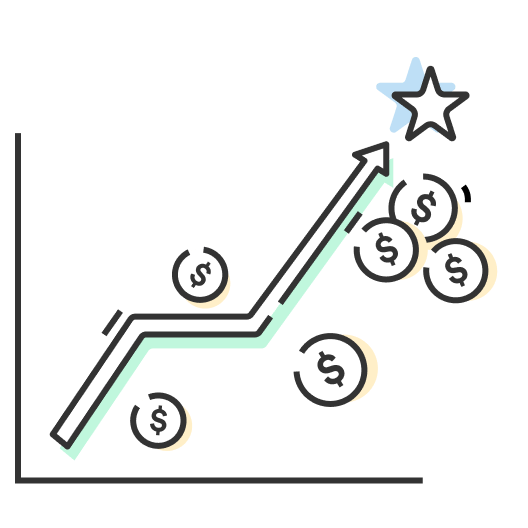The secured Chime® Credit Builder Visa® Credit Card¹ empowers qualifying Chime members to build credit with no annual fees or interest.² Just fund the Credit Builder secured deposit account with a security deposit,³ swipe the credit card on everyday purchases, and make on-time payments each month to help build your credit.⁴ Plus, with SpotMe, access coverage up to $200 when you use your Credit Builder card, fee-free⁵.
When you receive your Chime Credit Builder card, you’ll likely have questions about how to use it. We’ve answered some of the most common questions below:
Where can I use the Chime Credit Builder card?
You can use your Chime Credit Builder credit card anywhere Visa cards are accepted. Swipe it for everyday purchases – like gas, groceries, streaming services, recurring bills, and entertainment – and pay it off on-time by the end of each month.
Just make sure you fund your Credit Builder secured deposit account, so you can make purchases without issues. With SpotMe, Chime can spot you up to $200 fee-free.⁵
How much money should you transfer to your Credit Builder account?
That is totally up to you! Just remember that money moved to Credit Builder will be held in a secured account, and this amount determines how much you can spend with your Credit Builder card.³ If you want to spend more with your Chime credit card, you’ll need to add more money to the account.
At the end of the month, you can use the money in your secured account to pay your balance automatically with the Safer Credit Building feature. You can also manually pay off your balance with funds from your Chime checking account or secured account.
The easiest way to move money into Credit Builder is by using Move My Pay. This optional feature will move the amount of your choice into Credit Builder on every payday. You can also manually move money from your checking account at any time. Just tap Move money in the app to get started.
Can you make fee-free ATM withdrawals with Chime Credit Builder?
You can use your Credit Builder card to get cash at any ATM, but you won’t pay interest or fees at in-network ATMs.² When you use a credit card to withdraw cash from an ATM, you get what’s called a “cash advance.”
Unlike most credit cards, we don’t charge you interest or fees for this cash advance when you use your card at in-network ATMs.² Find a Chime ATM near you using the ATM Map in the Chime app.
Can I get fee-free coverage on my Chime Credit Builder card?
Yes! SpotMe® is available when you use Credit Builder. Now you can get covered up to $200 when you need it, fee-free.
Haven’t opened a Credit Builder account yet? Check out our step-by-step guide on how to sign up for a Chime Credit Builder card.
Consistent use of Credit Builder can build your payment history, increase the length of your credit history over time, and can balance out your credit mix. Learn more about how this works below:
How does the Chime Credit Builder card help you build credit?
The Chime Credit Builder card offers features that empower you to improve your credit score. Here’s how:
- On-time payment made easy: On-time payment is a crucial aspect of building credit. With our Safer Credit Building feature, we’ll use your money in the secured account to automatically pay your monthly charges. We report these payments to three major credit bureaus to help you build credit.
- Build credit with your own money: After you make a purchase with Credit Builder, you can use the money that is in your secured account to pay off the balance – automatically. By limiting spending to what you have in the account each month, you can more easily stay within your budget and avoid outstanding balances.
- No more credit utilization: With many credit cards, high credit utilization can negatively impact your credit score. However, Chime doesn’t report utilization because Credit Builder doesn’t have a preset limit – you set your limit with your own money. This means you don’t have to worry about a bad mark on your credit report because of a high utilization rate on your Credit Builder card.
- Increase credit score over time: The longer you maintain a healthy credit record, the more lenders view you as creditworthy. By maintaining a healthy Credit Builder account over time, you’ll increase your average credit age and show lenders that you can be responsible with credit products like loans.
Want to learn more about building credit with Chime? Find out how Credit Builder works in our in-depth guide.
How fast does Chime Credit Builder improve your credit score?
Each Chime member will have their own credit journey with Credit Builder. The impact on their credit will depend on their score before opening the Chime Credit Builder card, how often they use the card, their ability to make on-time payments, and additional credit factors outside the Credit Builder account.
That said, the average Chime member sees a 30-point increase in their credit score after approximately eight months of using the Credit Builder card.6
You may experience a temporary credit score decrease when you first open a Credit Builder account. Applying for a credit card results in a hard inquiry on your credit report; this can temporarily lower your credit score.
Opening a new credit card also lowers your average credit history length. The average length of your credit history is one factor that impacts your credit score. In general, the longer an account has been open and in good standing, the better it is for your credit score.7
Don’t stress too much about these early impacts on your credit score. As you make on-time payments with the help of Chime Credit Builder’s Safer Credit Building feature, your credit score could improve beyond where it started in several month’s time.6
FAQs
Do secured credit cards build credit?
Absolutely! Secured credit cards are a great tool for building credit, as long as the credit card issuer reports your activity to the major credit bureaus.
Credit bureaus determine your credit scores. Every month, most credit card companies and lenders, secured credit card providers included, will report your activities to credit bureaus. The bureaus update your credit score based on the activities reported.
Can you withdraw cash with the Chime Credit Builder Card?
Yes! Just like your Chime Visa® Debit Card, you can withdraw cash using your Credit Builder Card. Get cash fee-free² at 50,000+ ATMs found in stores you love like Walgreens®, 7-Eleven®, CVS®, and more!
Can I use my Chime Credit Builder card at an ATM?
Yes! You can get cash using your Chime Credit Builder card at any ATM. To avoid out-of-network fees,² we recommend using one of the 50,000+ in-network ATMs found in retailers like Walgreens®, 7-Eleven®, and CVS Pharmacy®. Go into your Chime app and use the ATM Map to find one close to you!
Does Chime help build credit?
The Chime Credit Builder card is designed to help you build credit. Credit Builder offers features that help you stay on top of key factors that impact your credit score. Consistent use and on-time payments of your Credit Builder card can help you build payment history and increase the length of your credit history. We report to the major credit bureaus – TransUnion®, Experian®, and Equifax® – to help you build credit over time.4
Can I overdraft my Chime Credit Builder card?
You cannot overdraft with your Chime Credit Builder card. However, to qualify for Credit Builder, you need a Chime Checking Account with qualifying direct deposits – the same criteria to be eligible for fee-free overdraft with SpotMe® when you use your Chime debit card.5
Can I add money to my Chime Credit Builder card?
You can add money to your Chime Credit Builder card from your Chime Checking Account at any time by using the Move Money feature in the Chime app. While you can do this manually, Chime also offers an optional feature called Move My Pay that automatically transfers money from your checking account to Credit Builder every time you get paid.
How does Chime Credit Builder work?
The secured Chime Credit Builder Visa® Credit Card is available to Chime Checking Account members.¹ This secured credit card has no annual fee, no minimum security deposit, and no credit check to apply.³
To use Credit Builder, move money from your Chime Checking Account to your Credit Builder secured account³ (manually or automatically). Then spend with the card anywhere Visa cards are accepted, up to the amount of money deposited into the account.
Each month, pay your balance with the money in your secured account (manually or automatically through the Safer Credit Building feature). Chime will then report on-time payments to the three major credit bureaus. If you keep up with on-time payments, you’ll see a boost in your credit score.6
Is the Chime Credit Builder card an actual credit card?
The Chime Credit Builder card is a secured credit card, which means you can add funds to the secured account (a security deposit) and then spend up to that amount. This design offers cardholders a safer way to build credit – with no annual fees and no interest.²
What's the best secured credit card?
Whether you’re new to credit or working on repairing your credit score, a secured credit card could be the right answer – and the market is full of great options. The secured Chime Credit Builder Visa® Credit Card is a popular choice because we don’t run a credit check. There’s also no annual fee, no interest², and no minimum security deposit required.³
How does the Chime credit card stack up against competitors? See for yourself:
Building credit takes time and dedication. The Chime Credit Builder card can be a useful tool along your journey – just keep up with on-time payments.
Are you ready to build credit using your own money and easy on-time payments? Sign up for a secured Chime Credit Builder Visa® Credit Card today.

 Log in
Log in



